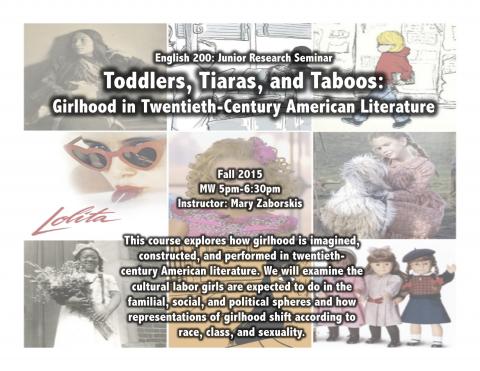Toddlers, Tiaras, and Taboos: Girlhood in Twentieth-Century American Literature
This course explores how girlhood is imagined, constructed, and performed in twentieth-century American literature. We will examine the cultural labor girls are expected to do in the familial, social, and political spheres and how representations of girlhood shift according to race, class, and sexuality. We will pay particular attention to texts featuring girls who deviate from prescribed models of girlhood, and the responses and anxieties their performances of girlhood signal. Course texts include Laura Ingalls Wilder’s Little House on the Prairie (1921), Vladimir Nabokov’s Lolita (1955), Audre Lorde's Zami (1982), and Alison Bechdel’s Fun Home (2006).
The Junior Research Seminar is designed to involve students in the kinds of research that the discipline of literary studies currently demands, including: working with primary sources and archival materials; reviewing the critical literature; using online databases of historical newspapers, periodicals, and other cultural materials; exploring relevant contexts in literary, linguistic, and cultural history; studying the etymological history and changing meanings of words; experimenting with new methods of computational analysis of texts; and other methodologies. The course typically involves a few main texts that are studied intensively from a variety of approaches. Research exercises throughout the semester will enable and culminate in a final project: either a scholarly essay of 10-15 pages or a creative project. In either case, the final project must emerge out of each student's intensive, independent research agenda.

 Department of English
Department of English
